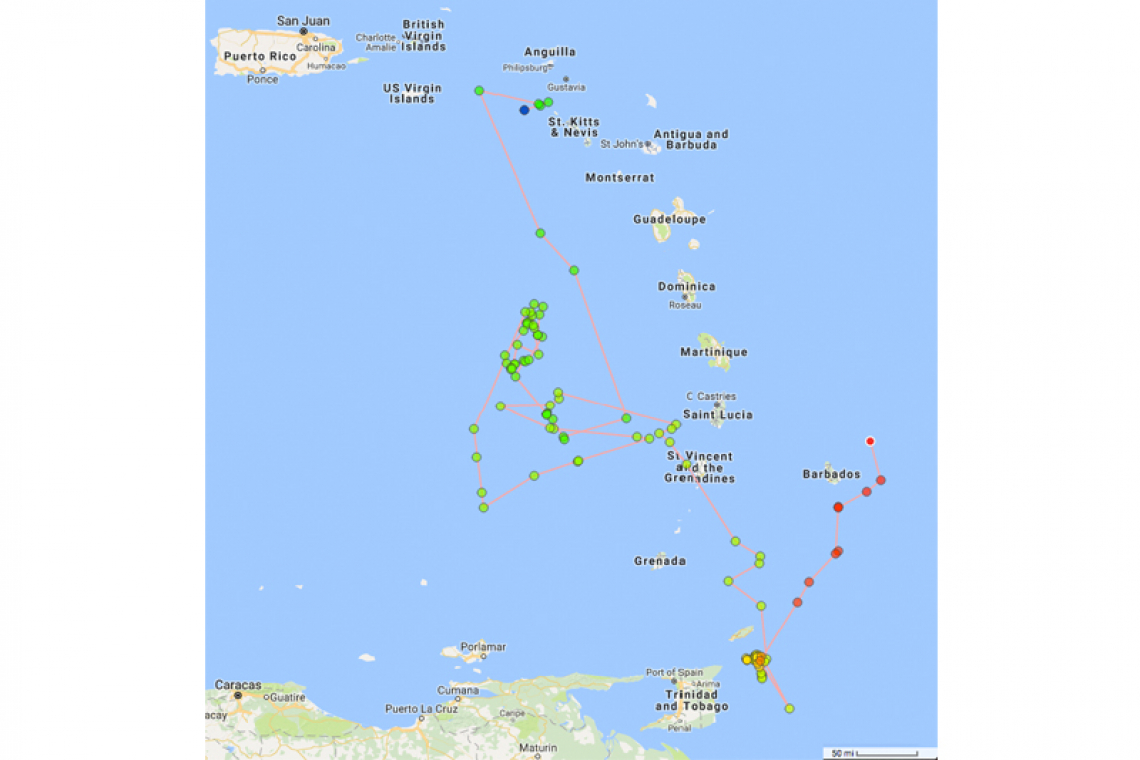The track of a 3-metre Tiger shark tagged on the Saba Bank is shown on this map, showing very little interaction with the Caribbean islands, but spending most of its time in the deeper open ocean and showing no return to the same location.
PHILIPSBURG--St. Maarten Nature Foundation reminds the public that sharks are a protected species in St. Maarten waters and cannot be hunted, caught or killed.
The foundation issued a statement in the wake of the tragic accident where a woman died from Tiger shark bites while swimming in Orient Bay last Thursday, offering its condolences to the victim’s friends and family.
“We have heard rumours of fishermen going out to hunt our local sharks due to this accident. However, our local sharks, such as reef sharks and nurse sharks, are not to be blamed for this accident,” explained Nature Foundation Manager Melanie Meijer zu Schlochtern. “Besides, sharks and rays are a protected species when in Dutch waters and catching, landing and killing will be prosecuted according to our legislation.
“Human fatalities due to shark bites are very rare and none were recorded here before this accident. No one will know the reason why this shark-biting occurred. However, we do want to stress that sharks are not killing machines. Rare accidents like this one can happen; however, most sharks are harmless and an important contributor to the health of our marine ecosystem.”
She said it is “extremely likely” that the shark had already disappeared into the deep ocean; besides sharks are not known to re-bite when realising the mistake, as humans are not their food source.
The Nature Foundation indicated that in its opinion a swimming ban is not deemed necessary and will only create additional fear among the population. But individuals who decide not to swim are being respected.
World-wide in 2019 there were a total of five fatalities due to shark bites, none close to this region.
“Therefore, we ask everyone to not let themselves be driven by fear, as most sharks are still harmless. Sharks are not out there to kill us, otherwise no one would be able to swim in our waters. Sharks are key species for the marine ecosystem and their presence is vital,” she stressed.
Sharks are still wild animals and top predators that survive due to their predatory skills. Therefore, accidents like this may occasionally happen.
“However, bites are often mistaken identities by the shark. The shark is confused, or curious, as splashing water can make them investigate the situation,” she continued. “There is no evidence that sharks are hunting humans or in any case eating them, although we are a very easy meal for them to catch. You would be surprised how often people are in the water with sharks, but they just ignore humans.
The Nature Foundation is aware of the occurrence of tiger sharks around St. Maarten and in the Caribbean region, especially juvenile tiger sharks are recorded in local waters and these sharks are researched and tagged by the foundation. The larger tiger sharks are passing by on their journey through the Caribbean region, but spend most of their time offshore in deeper waters, sometimes close to drop offs; for example, at the Saba Bank.
The Foundation is not in the support of shark- or fish-feeding and has always recommended to not feed marine life. There have been some suggestions made by the public that the cause of this incident is linked to shark-feeding dives being operated in St. Maarten.
Shark-feeding is no longer accepted within the Man of War Shoal Marine Protected Area since 2014 (Dutch side). In addition, in the past these dives were focused on the local species such as Nurse and Caribbean Reef sharks, which live in our waters.
Tiger sharks are migratory species and not seen during scuba dives, nor ever being fed. Therefore, local feeding is thought to be unlikely to influence such accidents, as large tiger sharks do not live here, they only pass by occasionally.







